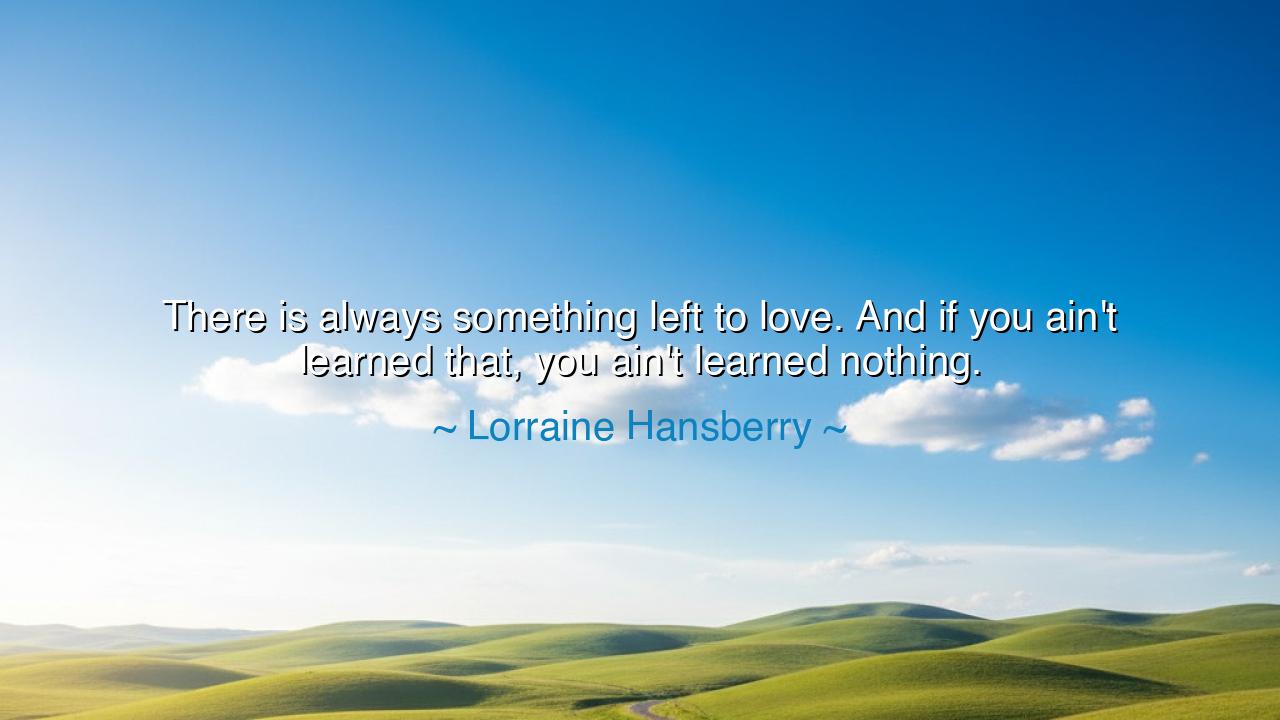
There is always something left to love. And if you ain't learned
There is always something left to love. And if you ain't learned that, you ain't learned nothing.






Lorraine Hansberry, in her profound reflection, speaks a truth that rings through the ages: “There is always something left to love. And if you ain’t learned that, you ain’t learned nothing.” These words carry with them the weight of the human experience, the eternal reminder that even in the most challenging and painful moments of life, love remains a constant, a force that endures even when all seems lost. Hansberry teaches us that love is not bound by perfect conditions or the fulfillment of all our desires; rather, it is a powerful force that can be found in the smallest, most overlooked corners of our lives. Love is not a finite resource, but an infinite wellspring, one that remains even in the face of adversity.
In the wisdom of the ancients, love was often seen as the highest virtue, a force that transcended all suffering and difficulty. Plato wrote of love as the means by which the soul is guided toward the divine, an unending pursuit of the beautiful and the good. Aristotle, too, in his writings on friendship, spoke of love as the foundation of all human connection—love that binds people together, that transcends self-interest, and that seeks the welfare of others. For the ancient philosophers, love was an eternal well, always available to those who sought it. And so, Hansberry’s words echo this ancient truth: that love is not bound by circumstance, nor by the limitations we place upon it—it is always available, always present, if we choose to see it.
Consider, O children, the story of Hercules, the great hero who, in the face of countless trials, never gave up his search for redemption, for meaning, and for love. Even after performing the Twelve Labors, a series of impossible feats meant to purify him, Hercules faced immense loss and suffering. Yet, in the end, it was his deep love for those he cared about, his willingness to sacrifice and persevere, that allowed him to achieve the ultimate peace. Through his suffering, he discovered that love was the reward for his trials. Even in the hardest moments, he found that there was always something to love—whether it was his duty, his companions, or the world he sought to protect. In Hercules’ journey, we see that the capacity to love, even through hardship, is a redemption in itself.
In a more modern context, let us reflect on the life of Nelson Mandela, who endured years of imprisonment, suffering, and separation from his loved ones. But even in the darkest days of his captivity, Mandela never lost his capacity for love. He loved his people, his vision for a united nation, and even those who had imprisoned him. His story teaches us that no matter the hardships we face, there is always something left to love—a cause, a dream, a belief. Mandela’s love for his country and for justice did not fade with his suffering. In fact, his ability to maintain love for others, despite the pain he endured, was the force that ultimately led to his freedom and the freedom of his people. His life shows us that love is not just about the personal, but about the greater good, the love we can offer to the world when we choose to rise above our own suffering.
Hansberry’s words remind us that love is not a commodity that can be used up or exhausted. It is infinite, ever-expanding, and always present, waiting for us to reach out and grasp it, even when it feels like we have nothing left. The love we have for others is often a reflection of the love we have for ourselves. And when we lose sight of this, when we feel that everything has been taken from us, it is essential to remember that love remains, hidden in the smallest corners, in the most unexpected places. It is in the darkest times that love has the potential to shine the brightest. As the ancients would say, love is the ultimate truth that never fades; it is the force that brings us back from the edge, that reminds us of our humanity, our purpose, and our connection to others.
So, O children of the future, take heed of this wisdom: no matter the trials you face, no matter the heartache or despair, there is always something left to love. It may not always be the love we desire, but it is the love we need—the love that sustains us, the love that redeems us, the love that connects us to each other and to the world. Do not let your heart grow cold in the face of hardship, but find the love that remains. For in that love, you will find your strength and your purpose. And remember, as Hansberry teaches us, if you have not learned to see the love that remains, then you have not yet truly learned the deepest truth of life: that love is always with us, and in it, we find everything we need to survive, to grow, and to flourish.






AAdministratorAdministrator
Welcome, honored guests. Please leave a comment, we will respond soon